Orcas’ latest boat attack claims yacht sailing in Strait of Gibraltar
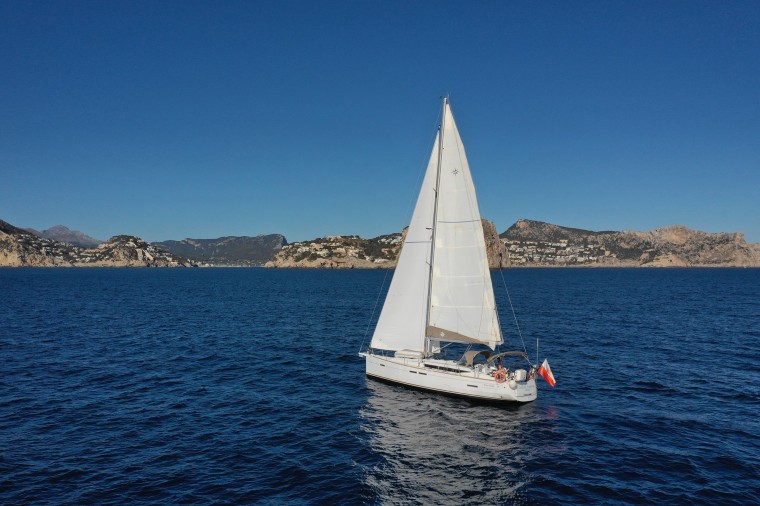
A yacht sank after it was attacked by a pod of orcas for 45 minutes, a sailing company has said, marking the latest assault on a boat by the sea mammals this year.
Polish tour operator Morskie Mile — which means "sea miles" — said in a Facebook post that its yacht Grazie Mamma II was attacked while sailing the Strait of Gibraltar between Spain and Morocco on Oct. 31.
The whales attacked the boat's rudder, the company said, causing major damage and a leak. Despite an attempt by the captain to take the boat to the nearest port, and a rescue attempt that involved the Moroccan Navy, the yacht sank near the entrance to the port of Tanger Med, about an hour's drive east of the city of Tangiers.
The boat's crew were unharmed, the company said in a statement that NBC News translated from Polish. The same statement was posted to the company's website by company owner Lech Lewandowski.
"For us, this yacht was everything that was great about sea sailing," he said.
"Long-term friendships were formed onboard. We sailed this yacht through the most beautiful places in Europe and the Atlantic archipelagos, trained numerous yacht helmsmen, discovered the beautiful and unknown, tasted Mediterranean specialties and sailed, sailed, sailed," Lewandowski continued.
The company said it was planning to honor forthcoming cruise bookings by using "friends' yachts." Future trips will take in the Baltic Sea, Norway, Italy and the Canary Islands, according to the company's website. A single leg of a voyage can cost 1,800 Polish zloty ($432).
In May, it emerged that orcas were responsible for attacking and sinking three boats in southern Europe. Encounters between orcas and humans have been increasing since 2020, researchers say , but no human deaths have been reported.
The increased orca-boat activity has led to a slew of internet memes this year, with some claiming they were joining the "orca wars" on the side of the orcas.
In September, a Russian boat on a round-the-world trip was sunk after a prolonged attack by tiny cookiecutter sharks.
Patrick Smith is a London-based editor and reporter for NBC News Digital.
- Share full article
Advertisement
Supported by

Orcas Sank 3 Boats in Southern Europe in the Last Year, Scientists Say
A small group of orcas is ramming into sailboats in waters off the Iberian Peninsula. Researchers say they do not know what is driving the unusual behavior toward boats.

By Isabella Kwai
Hours into a journey to Portugal from Morocco, the crew of a 46-foot sailing cruiser noticed something was wrong with the rudder. Then, someone shouted what they saw slicing through the choppy waves: “Orcas! Orcas!”
The orcas kept pace with the boat, slamming into its side and chewing at the rudder, according to its skipper, a photographer onboard and video of the encounter. For about an hour, the crew signaled their predicament to the Spanish Coast Guard and tried to stay calm.
“There was nothing we could do,” said Stephen Bidwell, the photographer, who was two days into a weeklong sailing course with his partner when the ramming began. “You’re in awe at the same time as you are nervous.”
The skipper, Gregory Blackburn, said he wrestled for control of the boat as the orcas banged into it, interfering with the rudder. “It’s a reminder of where we are in the food chain and the natural world,” he said.
Eventually the boat managed to motor back to Tangier, Morocco. But marine scientists took note of the episode, on May 2, and said it continued a puzzling pattern of behavior by a small group of orcas off the Iberian Peninsula’s western coast. The orcas, according to the researchers, have caused three boats to sink since last summer and disrupted the trips of dozens of others.
Wild orcas, although apex predators that hunt sharks and whales , are not generally considered dangerous to humans . The animals, the largest of the dolphin family , have been known to touch, bump and follow boats, but ramming them is unusual, marine scientists say. A small group of orcas, numbering about 15, started to batter boats around Spain in 2020, with researchers calling the behavior uncommon and its motivations unclear.
“We know that it is a complex behavior that has nothing to do with aggression,” said Alfredo López Fernandez, a biologist at the University of Aveiro in Portugal who worked on a study published last June on the subject. The orcas show no sign of wanting to hurt humans, he said.
In most sightings, the orcas do not change their behavior or make physical contact, according to the Atlantic Orca Working Group , which began tracking direct interactions — as well as sightings — in 2020.
Since an initial surge that year, orcas have been documented approaching or reacting to vessels about 500 times, causing physical damage about 20 percent of the time, in the high-trafficked seas near Morocco, Portugal and Spain, the group said.
The orcas off the Iberian coast are considered an endangered population : The group arrives in waters near the Strait of Gibraltar every spring from waters deeper and farther north up the coast to hunt tuna. But while they are a usual sight, scientists do not know how to stop the small group’s recent behavior, which has left sailors worried about safety and ship damage, and which has caught the attention of the Spanish and the Portuguese authorities.
“Every week there is an incident,” said Bruno Díaz López, a biologist and the director of the Bottlenose Dolphin Research Institute who was not involved in last year’s research. “We really don’t know the reason.”
In the most recent example, orcas battered a sailboat off the coast of Spain, causing it to sink in the early hours of May 5. The Spanish authorities quickly arrived, and the four people onboard were rescued “in good humor,” said Christoph Winterhalter, the president of the Swiss company that was operating the boat, Hoz Hochseezentrum International.
The University of Aveiro biologist, Dr. López Fernandez, said that it was possible that the three boats sank over the past year because they were vulnerable to leaks or not equipped to endure the damage. (“The condition of the boat was very good,” Mr. Winterhalter said of the one his company had chartered.)
The small group of orcas, including only two adults, were responsible for a majority of the interactions with boats, which number some 200 a year and range from the North African coast to France, according to Dr. López Fernandez.
Researchers do not know what is behind the behavior. Some have speculated that it is an “aversive behavior” that could have started after an incident between an animal and a boat, like an entanglement in fishing line, or an invented behavior from young orcas that is being repeated.
Those remain only theories, though Dr. López Fernandez said it appeared that the behavior might be passing between local animals.
“We know that orcas share their culture with their young and with their peers,” he said, adding that they learned from imitation. But because the behavior has been observed only in this particular subpopulation of orcas, he said that it was unlikely to pass onto distinct orca groups that populate waters around the world.
Given the lack of evidence and the presence of young orcas in the group, other scientists expressed skepticism that the behavior stemmed from a boat incident and believed that the animals may simply be playing.
“They’re getting some sort of reward or thrill from it,” said Erich Hoyt, an orca expert and research fellow with Whale and Dolphin Conservation, a wildlife charity. “Play is part of being a predator.”
Scientists say that aside from having sailors avoid the area, they do not know how to stop orcas from bothering sailboats, which tend to be quieter than most vessels and therefore more attractive to the animals.
It has also left conservationists worried about how humans will treat the orca population, especially as sailors in the region express growing frustration with the animals.
“I hope that they stop doing it as quickly as they started, because it’s actually imposing a risk on themselves,” said Hanne Strager, a marine biologist and the author of “ The Killer Whale Journals ,” adding that it was putting pressure on an already vulnerable species.
Mr. Bidwell, the photographer, said the episode would not stop him and his partner from booking another sailing trip in June, though perhaps with some changes. “Maybe we don’t go that same route,” he said.
Isabella Kwai is a breaking news reporter in the London bureau. She joined The Times in 2017 as part of the Australia bureau. More about Isabella Kwai
- Skip to main content
- Keyboard shortcuts for audio player
Killer whales are 'attacking' sailboats near Europe's coast. Scientists don't know why
Scott Neuman
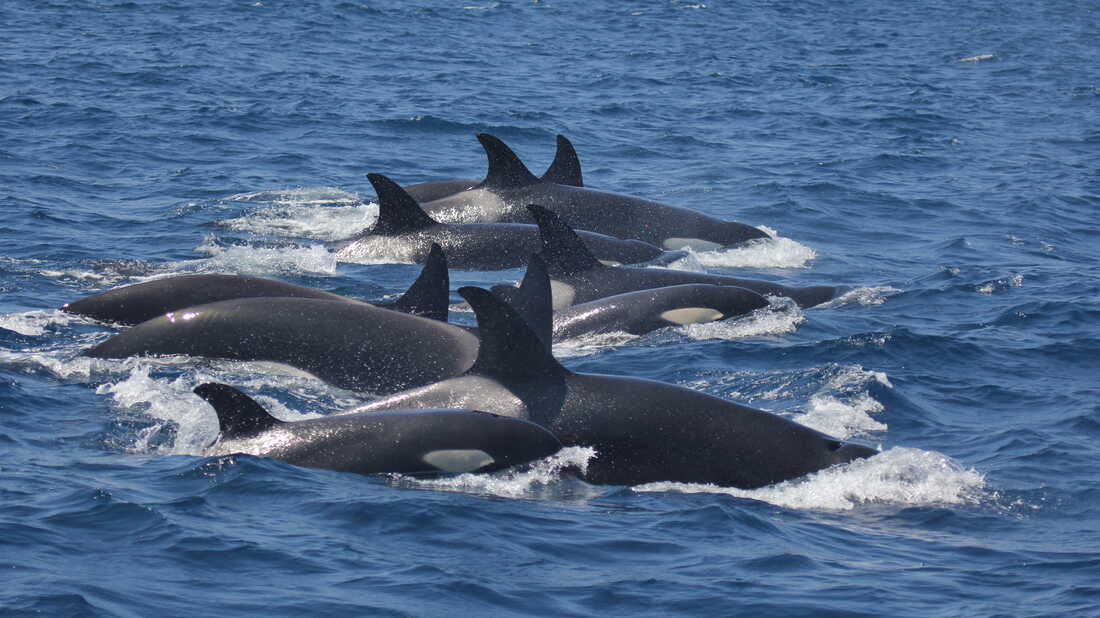
An orca pod seen in the Strait of Gibraltar in 2021. Renaud de Stephanis/CIRCE Conservación Information and Research hide caption
An orca pod seen in the Strait of Gibraltar in 2021.
Ester Kristine Storkson was asleep on her father's small yacht earlier this month, sailing off the coast of France, when she was violently awakened.
Scrambling on deck, she spotted several orcas, or killer whales, surrounding them. The steering wheel swung wildly. At one point, the 37-foot sailboat was pushed through 180 degrees, heading it in the opposite direction.
They were "ramming the boat," Storkson says. "They [hit] us repeatedly ... giving us the impression that it was a coordinated attack."
"I told my dad, 'I'm not thinking clearly, so you need to think for me,'" the 27-year-old Norwegian medical student says. "Thankfully, he is a very calm and centered person, and made me feel safe by gently talking about the situation."
After about 15 minutes, the orcas broke off, leaving father and daughter to assess the damage. They stuck a GoPro camera in the water, she says, and could see that "approximately three-quarters of [the rudder] was broken off, and some metal was bent."

A screen grab from a video of the encounter between a pod of orcas and the Storkson boat. Ester Kristine Storkson/ hide caption
A screen grab from a video of the encounter between a pod of orcas and the Storkson boat.
For any vessel, losing steering at sea is a serious matter and can be dangerous in adverse conditions and some sailboats have had to be towed into port after orcas destroyed their rudders. Fortunately, the Storksons had enough of their rudder left to limp into Brest, on the French coast, for repairs. But the incident temporarily derailed their plan to reach Madeira, off northwest Africa, part of an ambitious plan to sail around the world.
There is no record of an orca killing a human in the wild. Still, two boats were reportedly sunk by orcas off the coast of Portugal last month, in the worst such encounter since authorities have tracked them.
The incident involving the Storksons is an outlier, says Renaud de Stephanis, president and coordinator at CIRCE Conservación Information and Research, a cetacean research group based in Spain. It was farther north -- nowhere near the Strait of Gibraltar, nor the coast of Portugal or Spain, where other such reports have originated.
That is a conundrum. Up to now, scientists have assumed that only a few animals are involved in these encounters and that they are all from the same pod, de Stephanis says.
"I really don't understand what happened there," he acknowledges. "It's too far away. I mean, I don't think that [the orcas] would go up there for a couple of days and then come back."
These encounters — most scientists shun the word "attack" — have been getting the attention of sailors and scientists alike in the past two years, as their frequency seems to be increasing. Sailing magazines and websites have written about the phenomenon, noting that orcas seem to be especially attracted to a boat's rudder. A Facebook group , with more than 13,000 members, has sprung up to trade personal reports of boat-orca encounters and speculation on avoidance tactics. And, of course, there are no shortage of dramatic videos posted to YouTube.
Scientists don't know the reason, but they have some ideas
Scientists hypothesize that orcas like the water pressure produced by a boat's propeller. "What we think is that they're asking to have the propeller in the face," de Stephanis says. So, when they encounter a sailboat that isn't running its engine, "they get kind of frustrated and that's why they break the rudder."
Even so, that doesn't entirely explain an experience Martin Evans had last June when he was helping to deliver a sailboat from Ramsgate, England, to Greece.
About 25 miles off the coast of Spain, "just shy of entering the Strait of Gibraltar," Evans and his crew mates were under sail, but they were also running the boat's engine with the propeller being used to boost their speed.
As Evans was on watch, the steering wheel began moving so violently that he couldn't hold on, he says.
"I was like, 'Jesus, what's this?'" he recalls. "It was like a bus was moving it. ... I look to the side, and all of a sudden I could just see that familiar white and black of the killer whale."
Evans noticed "chunks of the rudder on the surface."
Jared Towers, the director of Bay Cetology, a research organization in British Columbia, says "there's something about moving parts ... that seem to stimulate them."
"Perhaps that's why they're focused on the rudders," he says.
The population of orcas along the Spanish and Portuguese coasts is small and de Stephanis believes that the damage to boats is being done by just a few juvenile males.
If so, they may simply outgrow the behavior, de Stephanis says. As the young males get older, they will need to help the pod hunt for food and will have less time for playing with sailboats.
"This is a game," he speculates. "When they ... have their own adult life, it will probably stop."

An orca calf, photographed in the Strait of Gibraltar, in 2021. Renaud de Stephanis/CIRCE Conservación Information and Research hide caption
An orca calf, photographed in the Strait of Gibraltar, in 2021.
Towers says such "games" tend to go in and out of fashion in orca society. For example, right now in a population he studies in the Pacific, "we have juvenile males who ... often interact with prawn and crab traps," he says. "That's just been a fad for a few years."
Back in the 1990s, for some orcas in the Pacific, something else was in vogue. "They'd kill fish and just swim around with this fish on their head," Towers says. "We just don't see that anymore."
Orcas Sink Another Boat in the Strait of Gibraltar
The crew is safe, but the marine mammals did so much damage to the Polish sailing yacht that it couldn’t make it back to port
/https://tf-cmsv2-smithsonianmag-media.s3.amazonaws.com/accounts/headshot/SarahKuta.png)
Daily Correspondent
:focal(1030x736:1031x737)/https://tf-cmsv2-smithsonianmag-media.s3.amazonaws.com/filer_public/f9/1c/f91c42d5-c718-4cb5-9d70-85bc93394c58/gettyimages-912020698.jpg)
The orcas are at it again : A pod of the black-and-white marine mammals sank a sailing yacht off the coast of Morocco in the Strait of Gibraltar last week. This marks the fourth vessel orcas have sunk in the region within the last two years, according to Live Science ’s Harry Baker.
On the afternoon of October 31, orcas repeatedly rammed into the Grazie Mamma , a vessel owned by the Polish cruise company Morskie Mile, according to a translated Facebook post from the company. The animals hit the rudder for 45 minutes, causing damage to the boat that filled it with water.
In response, the captain, crew members, search and rescue personnel, port tugboats and the Moroccan Navy worked together to try to bring the damaged yacht safely into port at Tanger-Med. But despite their efforts, the ship sank near the port’s entrance. Fortunately, the crew is “safe, unharmed and sound,” per the Facebook post.
The Grazie Mamma ’s demise is just one of several recent, headline-grabbing incidents involving orcas in the Strait of Gibraltar, a narrow waterway that connects the Mediterranean Sea and the Atlantic Ocean. The strait is flanked by Spain to the north and Morocco to the south.
Researchers and sailors alike are baffled by the disruptive behavior of the orcas that inhabit the strait, which are categorized as a distinct—and critically endangered—subpopulation . For the last three years, several members of this group have been colliding with vessels and, in some instances, causing so much damage the boats sink.
Since 2020, scientists have recorded more than 500 interactions between orcas and ships off the Iberian peninsula, Live Science ’s Sascha Pare reported in May. That represents a small fraction of the total vessels that pass through the strait, but the unusual incidents have garnered worldwide attention nonetheless. The so-called killer whales have become social media stars, with memes and even merchandise suggesting they’re coordinating an “ orca uprising .”
Scientists don’t know for sure why the orcas are targeting vessels, but they have urged onlookers to avoid assigning human attributes to the creatures, and especially to refrain from framing their actions as retaliation, reports the Washington Post ’s Dino Grandoni.
“We believe this narrative inappropriately projects human motivations onto these whales, and we are concerned that perpetuating it will lead to punitive responses by mariners or managers,” a group of 35 scientists wrote in an open letter this August.
Orcas are highly social animals, and in the past, they have periodically adopted short-lived fads, such as wearing dead salmon on their heads like hats. While the vessel strikes are persisting longer than a typical fad, they might disappear just as quickly as they began, the scientists wrote. But overall, it appears unlikely the creatures are behaving maliciously or seeking revenge on humans.
“I just don’t really see it as an agonistic activity,” said Deborah Giles , a marine biologist at the University of Washington and director of the conservation research organization Wild Orca, to the Los Angeles Times ’ Susanne Rust earlier this year.
So far, the behavior has mostly been isolated to the group inhabiting the waters off the Iberian peninsula—though, this summer, one incident did occur more than 2,000 miles away near Scotland.
One theory scientists have for the behavior is that orcas are simply having fun—they see boat rudders, then use their noses to push them until they snap.
“They’re pushing, pushing, pushing—boom! It’s a game,” Renaud de Stephanis , a scientist who leads the marine research group Conservation, Information and Research on Cetaceans (CIRCE), told BBC Future ’s Sophie Hardach in June. “Imagine a kid of 6, 7 years, with a weight of three tonnes. That’s it, nothing less, nothing more. If they wanted to wreck the boat, they would break it in ten minutes’ time.”
Another theory is that a female orca within the group named White Gladis may be acting out because of a past traumatic run-in with a vessel. Perhaps, then, the behavior is catching on among juveniles, because they “look up to these very important females in the pod,” in orcas’ matriarchal society , as Alfredo López Fernandez , a biologist at the University of Aveiro in Portugal and a member of the Atlantic Orca Working Group, said to CNN ’s Jacopo Prisco in June.
Still, some scientists point out that we, as humans, cannot presume to know the orcas’ motivation. And any attempts to guess are just that: guesswork.
“Nobody knows why this is happening,” Andrew W. Trites , director of marine mammal research at the University of British Columbia in Canada, told CBS News earlier this year. “My idea, or what anyone would give you, is informed speculation. It is a total mystery, unprecedented.”
Get the latest stories in your inbox every weekday.
/https://tf-cmsv2-smithsonianmag-media.s3.amazonaws.com/accounts/headshot/SarahKuta.png)
Sarah Kuta | READ MORE
Sarah Kuta is a writer and editor based in Longmont, Colorado. She covers history, science, travel, food and beverage, sustainability, economics and other topics.
- International edition
- Australia edition
- Europe edition
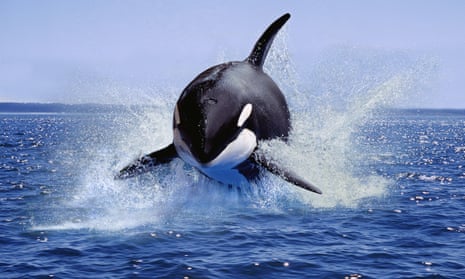
The orca uprising: whales are ramming boats – but are they inspired by revenge, grief or memory?
A pod in the strait of Gibraltar has sunk three boats and damaged dozens of others, and their story has captivated the world. What explains this unprecedented behaviour?
W hat’s going on with the #orcauprising? You’ve probably gathered the basics: orcas are “attacking” yachts . To be strictly factual, since 2020, a small pod of orcas in the strait of Gibraltar has been interacting with sailing boats in a new way: ramming vessels, pressing their bodies and heads into the hulls and biting, even snapping off, the rudders. Over three years, more than 500 interactions have been recorded, three boats sunk and dozens of others damaged. Last month, the first instance of this behaviour was recorded in another place, when an orca rammed a boat near Shetland . “What I felt [was] most frightening was the very loud breathing of the animal,” said the Dutch yachtsman targeted, Dr Wim Rutten, who had been fishing for mackerel. “Maybe he just wanted to play. Or look me in the eyes. Or to get rid of the fishing line.”
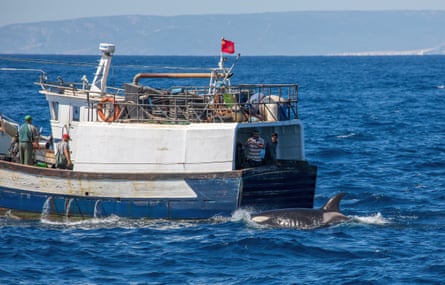
There are two fascinating things about this. First, of course, what are the orcas doing? But the second is about another species entirely: us. Why do we like this story so much? Because we do: people – including me – love the idea of orcas attacking boats. Browsing through orca memes, there’s an orca as the sickle in the hammer and sickle , with the headline “eat the rich”, and a Soviet-style graphic of a heroic orca emerging under a superyacht . “What if we kissed while watching the orcas take back the ocean,” reads one tweet with 1m views, while a much-used image of an arm holding a microphone up to a captive orca has been repurposed endlessly to highly entertaining effect – I like one where it’s “singing” a bespoke version of the Meredith Brooks classic : “I’m a bitch / I’m an orca / Sinking yachts /Just off Majorca [sic] / I’m a sinner I’m a whale / Imma hit you with my tail.” We’re taking great pleasure in projecting extremely human narratives and motivations on orcas. But how wrong is that, and why does it appeal?
The first question is easier to answer, or rather not to answer: we don’t know what they’re doing or why. “What I think is most exciting about this is that actually, we don’t know at all,” says Tom Mustill, a biologist and film-maker, who wrote How to Speak Whale , after a humpback whale landed on his kayak (the jaw-dropping footage is on YouTube ). “When we step outside our rush to project, it’s actually very reflective of where we’re at with cetacean sciences: we’re starting to understand that they’re so complicated and nuanced, and that individuals are very different from one another.” Even if we’re in the conscious incompetence phase of learning about orca behaviour, there are expert theories. “It could be a curious and playful behaviour,” suggests the 2021 report from the Grupo Trabajo Orca Atlántica (GTOA, or Atlantic Orca Working Group) , a partnership of Spanish and Portuguese scientists.
That’s a popular hypothesis that Philip Hoare , the author of Leviathan and Albert and the Whale , broadly supports. Hoare experienced his own orca interaction in Sri Lanka, when a small pod head-butted and charged his boat: “I have never been so excited and so fearful in my life,” he tells me. “They’re tremendously powerful, incredibly intelligent, incredibly well organised; if that species wanted to do anything with us in the ocean, they could.” There are no reported instances of wild orcas killing people, but, says Mustill: “If killer whales wanted to start attacking people, disabling small vessels is a very strange way of going about that. They could just start eating swimmers all over the place.”
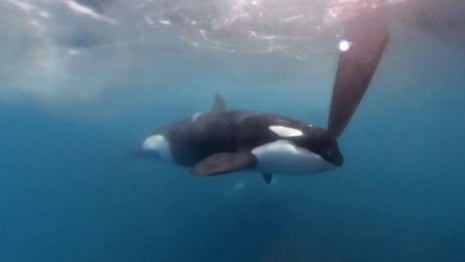
There are alternative theories. The fibreglass hulls of sailing boats might just feel nice – and orcas enjoy the sensory feedback: some Canadian pods seem to enjoy rubbing themselves on smooth pebbles ( you can watch them on a webcam ); or it might just be a trend. As Mustill explains, a number of observed orca fads are not obviously examples of “adaptive” behaviour (meaning “useful”) – most famously the one for wearing salmon as hats . They’ve also mimicked sea lions , and some pods engage in “greeting ceremonies”, described as like “a killer whale mosh pit” . Social learning – from each other – is well documented in orca culture and, yes, “culture” is how behavioural science describes it. “These are cultural beings,” says Barbara J King, professor emerita of anthropology at the College of William & Mary, Virginia, and author of Animals’ Best Friends . “The networks of individuals in orca societies, which are led by females, are highly attuned to each other’s behaviour, so traditions evolve over time that become, in some cases, cross-generational.”
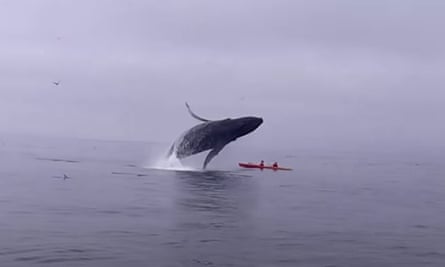
But how about revenge, as many of the memes suggest? The Atlantic Orca Working Group 2021 report also suggested the interactions might be responding to individual orcas’ experiences: “A behaviour induced by an aversive incident, and therefore a precautionary behaviour.” Given a single “matriarch” orca, “White Gladis”, appears to have started these interactions , it has been suggested a prior injury or entanglement could have led her to act. Does that make it revenge? King doesn’t dismiss the idea out of hand. “If we’re talking about capacity, it’s not outside the realm of reasonable expectation and it would not necessarily be anthropomorphic,” she says, though, “I’m not suggesting this in support of an ‘uprising’ at all.” King has worked extensively on animal grief: her Ted talk on one orca, Tahlequah, who in 2018 carried her dead calf for 17 days and 1,000 miles , has had 3.5m views. “I don’t believe grief is a human emotion; I feel the same way about joy and sorrow. So what about revenge?” She points to narratives around elephants perpetrating destructive acts , which has also been presented as possible retribution for poor treatment. “Both orcas and elephants have the memory capacity and the intelligence to put these things together.” Some primates, she says, also use “kin-redirected aggression: where if a monkey is attacked, that monkey within a short period of time redirects aggression to the relatives of the opponent.”
Orcas, Hoare says, will have a clear sense of what humans have done to their environment. As demonstrated by the actions of White Gladis , orca society is matriarchal, and females can live to 100: “They will have a memory, almost a generational memory, of a time when the ocean was not dominated by human beings; when there were not seismic surveys, steam engines then diesel engines, military sonar … The most important thing for them is sound: there will be individual whales that remember when the sea was not that noisy.”
So they know what we’ve done and we know what we’ve done too. I think one of the reasons the #orcauprising resonates is our sense of collective guilt or, as Mustill puts it, “We feel like there’s something deeply unfair happening in the ocean.” From films such as Free Willy to Blackfish , we have become aware of how grotesque the idea of keeping captive orcas is, and we’re ever-more conscious of the degraded state of our seas. Hoare says pictures of the Iberian whales suggest they are in poor condition, with ribs showing on one of the most widely used pictures. “They’re skinny. They are signifiers of this massively impacted environment.” As Grimes tweeted : “We deserve to have our boats rammed, frankly.”
King is frustrated that our response has been typified by the silliness of social media posts. “If people truly believe that this is about orcas responding to human harms, then why isn’t the response not just this jokey ‘orca uprising’?” she asks. “Why isn’t this the moment that people say: ‘Whatever the orcas are doing, I recognise anthropogenic harms. This is an opportunity for me: I’m going to stop eating their prey; I’m going to support ocean restoration; I’m going to support the idea of marine sanctuaries for captive orcas’?”
But fitting their behaviour to a narrative that suits us is entirely in keeping with our perennial misunderstanding of cetaceans. Hoare sees these interactions and our reaction to them as representative of how, over our shared history, “whales have had to change according to what we want them to be.” We’ve always imposed a narrative on whales, he explains, from their appearance in creation myths and religious texts, coupled with a view of whales as terrifying monsters, reinforced by Moby-Dick . The “utter and absolute depredation of whale populations” of the early 20th century was eventually countered by the early conservation movement and, crucially, bio-acoustician Roger Payne’s Songs of the Humpback Whale , shifting our perception of them from monstrous killers to mystical barnacled angels that sing. We see them, as Mustill says, as “incredible, empathic, beautiful”, which is also an oversimplification. A friend, he says, was recently rhapsodising about orcas. “I said: ‘You know they also toy with sea turtles and, like other cetaceans, they do infanticide?” Both Hoare and Mustill note that their rebranding from “killer whale” to “orca” was not particularly popular with scientists, as it was an accurate name for consummate predators. “Maybe they’d like to be thought of as killer whales?” says Mustill. “I’ve seen them hunting and they do these things which look like celebrations – they’re active, they leap out of the water and make a lot of noise splashing. It’s not necessarily a shameful thing to kill.”
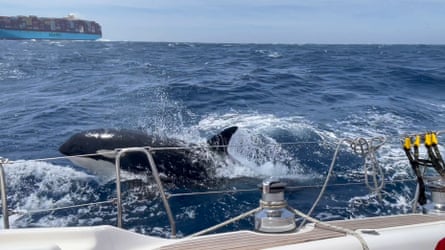
One very human-coloured notion is the idea that orcas aren’t just taking back the ocean but are somehow fomenting revolution, since the yachts they are ramming are so intimately associated with the ultra-wealthy. White Gladis has been called “a communist orca”. As one post reads : “The orcas have done more for the working class than our elected officials ever have”; another captions the famous John Cusack boombox scene from Say Anything : “Me standing outside the yacht club playing orca sounds.” It’s silly, but so appealing. “I must admit it’s very attractive,” says Hoare, though he emphasises that he doesn’t want to see anyone hurt. “I love it too,” says Mustill. “We see something intrinsically fair in these giant, clever, enigmatic killers righting a wrong.” There’s also a sense of wish fulfilment. “It speaks to our feeling of powerlessness,” says Mustill. “We’ve not been going out sinking billionaires’ yachts, even though we could.”
“The killer whales are not our friends” read the headline on a much-memeified recent Atlantic article (“Jacob Stern [the author] will be the first to go in the orca revolution” as one tweeter put it ). But, if they’re not friends, what are they to us? What are we to them? Could we be allies? Mustill recalls a strange and wonderful story from 19th-century New South Wales in Australia, where orcas assisted a family of whalers, who were hunting baleen whales, in return for a share of the catch (the tongue) for more than 40 years. “They’re very interested in us,” says Hoare. “Every whale I’ve met, and I’ve met thousands, they’re all interested in us. Because they know there’s nothing out there in their ocean – other than other whales – that is like us. We’re talking about all this now; there’s an equivalent conversation going on in orca society. Orca are podcasting. Literally podcasting. I’ll copyright that joke!” He sends me a 10-second recording of sound captured during his own interaction with the orca pod in Sri Lanka – a complex soundscape of clicks, rasps and squeaks that gives me goosebumps. “If you could only translate that, everything that has been written about this would be rendered defunct. We’ll all be proved wrong.”
- Marine life
Comments (…)
Most viewed.
Watch CBS News
Killer whales sink yacht after 45-minute attack, Polish tour company says
By Emily Mae Czachor
November 6, 2023 / 9:58 AM EST / CBS News
A group of orcas managed to sink a yacht off the coast of Morocco last week, after its 45-minute attack on the vessel caused irreparable damage, a Polish tour company said.
The incident happened Tuesday, Oct. 31, as a crew with the boat touring group sailed through the Strait of Gibraltar. The narrow waterway bridges the Mediterranean Sea and the Atlantic Ocean, which separates the southern tip of Europe from northern Africa.
A pod of orcas, colloquially called killer whales, approached the yacht and "hit the steering fin for 45 minutes, causing major damage and leakage," the tour agency Morskie Mile, which is based in Warsaw and operated the yacht, wrote on Facebook in a translated post.
Although its captain and crew were assisted by a search-and-rescue team as well as the Moroccan Navy, the yacht could not be salvaged. It sank near the entrance to the port of Tanger-Med, a major complex of ports some 30 miles northeast of Tangier along the Strait of Gibraltar. None of the crew members were harmed, said the Polish tour agency, adding that those on board the sunken yacht were already safe and in Spain by the time their Facebook post went live.
"This yacht was the most wonderful thing in maritime sailing for all of us. Longtime friendships formed on board," wrote Morskie Mile. The company said it was involved in other upcoming cruises in the Canary Islands and would work to make sure those boat trips went ahead as planned.
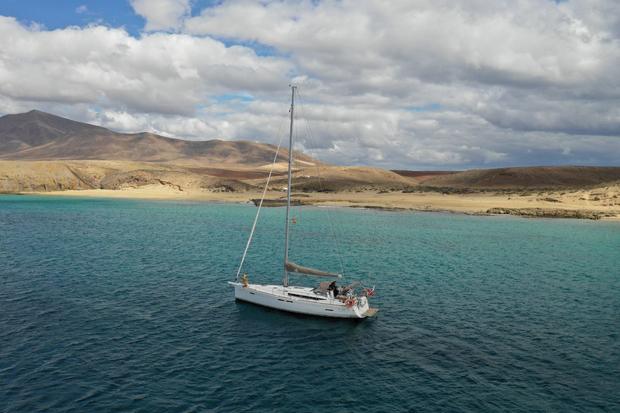
Last week's incident in the Strait of Gibraltar was not the first of its kind. Reported attacks by killer whales that seem to be trying deliberately to capsize boats off the coast of Spain and Portugal have more than tripled over the last two years, according to data released in the spring by the research group GTOA, which studies orcas around Gibraltar.
"Nobody knows why this is happening," Andrew W. Trites, professor and director of Marine Mammal Research at the University of British Columbia, told CBS News in May. "My idea, or what anyone would give you, is informed speculation. It is a total mystery, unprecedented."
GTOA recorded 52 maritime interactions with orcas between the Strait of Gibraltar and Galicia, a coastal province in northwestern Spain, between July and November 2020. The incidents picked up in the years that followed, with 197 interactions recorded in 2021 and 207 recorded in 2022, GTOA said, noting that the interactions mainly affected sailboats.
Then, in June of this year, one of two sailing teams involved in an international race around the world reported a frightening confrontation involving multiple orcas as they traveled through the Atlantic Ocean to the west of Gibraltar. The teams, which were competing in The Ocean Race, said the orcas did not damage their boats or harm crews, but recalled the sea creatures pushing up against and, in one instance, ramming into one of the boats. The orcas also nudged and bit the rudders, one crew member said.
Caitlin O'Kane and Kerry Breen contributed to this report.
Emily Mae Czachor is a reporter and news editor at CBSNews.com. She covers breaking news, often focusing on crime and extreme weather. Emily Mae has previously written for outlets including the Los Angeles Times, BuzzFeed and Newsweek.
More from CBS News

Blinken says Gaza's entire population facing "acute food insecurity"

Icelandic volcano erupts yet again, nearby town evacuated

Forced sale of TikTok "absolutely could" happen before election, Gallagher says

Dr. Dre says he had 3 strokes while in hospital for brain aneurysm
Orcas sink another boat in Europe after a nearly hour-long attack
For the fourth time in two years, a group of unusually brazen orcas in southwestern Europe have sunk a sailing boat after relentlessly attacking it for almost an hour on Halloween.
A pod of orcas has attacked and sunk another boat in southwestern Europe after relentlessly bombarding the vessel and its crew for almost an hour on Halloween. It is the fourth time that orcas from this region's population have sunk a vessel in the last two years.
On Oct. 31, the Grazie Mamma — a mid-size sailing yacht owned by Polish cruise company Morskie Mile — was attacked by an unknown number of orcas for around 45 minutes off the coast of Morocco in the Strait of Gibraltar, Morskie Mile representatives wrote in a Facebook post translated from Polish.
The orcas ( Orcinus orca ), also known as killer whales , repeatedly hit the yacht's rudder causing major damage and allowing water into the vessel's hull. Despite receiving aid from the Moroccan Navy and being towed toward safety, the boat eventually sank as it entered the port of Tanger-Med in Morocco. All passengers were safely evacuated to rescue boats before the ship sank.
The unusual attack is the latest example of one of many unnerving new orca behaviors that have highlighted the striking intelligence of these deadly predators.
Related: 11 ways orcas show their terrifying intelligence
Since 2020, orcas have been regularly harassing boats in the Strait of Gibraltar — a narrow strait between Spain and Morocco that connects the Atlantic Ocean to the Mediterranean Sea — and the surrounding waters off the coast of the Iberian peninsula.
These nautical raids were likely started by a pod including White Gladis, a female orca who may have been traumatized by a past boat collision . The unusual behavior then spread among other individuals who seem to be becoming more daring and efficient with their attack s .
So far, at least three other boats have been sunk in the area , with the most recent incident occurring in May 2023 and the previous two both occurring in 2022. And in June, a yacht had its rudder ripped clean off with "ruthless efficiency" in a 15-minute attack.
Researchers suspect that orcas are learning to attack boats from one another. Witnesses have also reported seeing orcas "teach" other individuals how to maximize the damage they cause, Live Science previously reported.
Related: How often do orcas attack humans?
So far, only one other boat has been attacked outside of the Strait of Gibraltar and its surrounding waters: A yacht in Scotland, more than 2,000 miles (3,200 kilometers) away, which was rammed by a lone individual . However, it is impossible to directly link this attack to the other orcas.
— Orca appears to adopt (or abduct) a baby pilot whale
— Extremely rare white killer whale spotted off California coast
— Dolphins and orcas have passed the evolutionary point of no return to live on land again
Boat attacks are not the only unusual learned orca behavior that scientists have taken note of in recent years.
Since 2017, a pair of orcas known as Port and Starboard have killed dozens of great white sharks in South Africa by ripping out their livers. And on Oct. 17 this year, this behavior was also documented in Australia for the first time , hinting it may also be spreading.
Sign up for the Live Science daily newsletter now
Get the world’s most fascinating discoveries delivered straight to your inbox.

Harry is a U.K.-based senior staff writer at Live Science. He studied marine biology at the University of Exeter before training to become a journalist. He covers a wide range of topics including space exploration, planetary science, space weather, climate change, animal behavior, evolution and paleontology. His feature on the upcoming solar maximum was shortlisted in the "top scoop" category at the National Council for the Training of Journalists (NCTJ) Awards for Excellence in 2023.
Dying orca's final moments after 'desperate' effort to stay afloat captured in 1st of its kind footage
Orcas are learning terrifying new behaviors. Are they getting smarter?
Space photo of the week: James Webb telescope snaps stunning 'tapestry of star birth' peppered with cavernous galactic voids
- Rivegauche610 Time to start responding with extreme prejudice. Who do they think they are, trumpanzees? Russians? Reply
- orcaenjoyer Time to start breeding more orcas and letting them loose in the Mediterranean and Somalian coasts Reply
- Orca10 I definitely agree with that idea...they are retaliating to the abuse they suffered from human beings....remember, they are highly intelligent.... Reply
- Thorneel Might be no harm to carry a cattle prod on-board, to teach them another lesson. Reply
- georgeodjungle We've been experimenting with a trailing hot wire it's a little hard on the anodes but they turn tail works on mostly everything except seals 12 volt okay 24 works better 120 works really really well but again it's hard on the anodes Reply
- dmissu2 After years we now believe, thanks to all the scientific world discoveries information shared with the world that Orcas are smart, very smart. I submit that in this particular area of the world/oceans these Orcas, perhaps even a pod or more, have been strongly offended by humans in some way and over the last couple of years are now making their objections known. Perhaps suspicious boaters have injured them, killed an orca (young or a leader) either intentionally or not, humans have strongly upset them and they want us to know. Perhaps it continues to occur and they want us to stop. I believe the authorities in this area need to investigate and figure out if something humans are doing have set them off and stop it from happening before more innocent boaters pay the price of those without conscious. Reply
- georgeodjungle Hotwire,,, problem solved Reply
- Pennyforthoughts Note to Harry Baker: photo supposedly depicting the orcas in the Strait of Gilbraltor looks, in fact, like an image of orcas in the Strait of Georgia (or the Georgia Strait) between the British Columbia mainland and Vancouver Island in Canada. Orcas are plentiful there....as are photos of orcas. Reply
- Zuhalter BREAKING: Biden vows to stop orcas at any cost, requests Congress to send $4 billion arms package to Europe and increase sanctions against Sea World. In response, Shamu releases press statement: "Mrrrrrrrrr, eee eeeeee.... kiiiiikk-k-k-k-, klik klik klik-k-k-k.... raaaawwrrrrr! Reply
- fekubichonigo Too bad the "people" didn't die. I spit on the rich Reply
- View All 10 Comments
Most Popular
By Sascha Pare March 15, 2024
By Orla Loughran Hayes March 15, 2024
By Keumars Afifi-Sabet March 15, 2024
By Keith Cooper March 15, 2024
By Robert A. Schwartz March 15, 2024
By Samantha Mathewson March 15, 2024
By Emily Cooke March 14, 2024
By Stephanie Pappas March 14, 2024
- 2 Mass grave of plague victims may be largest ever found in Europe, archaeologists say
- 3 India's evolutionary past tied to huge migration 50,000 years ago and to now-extinct human relatives
- 4 1,900-year-old coins from Jewish revolt against the Romans discovered in the Judaen desert
- 5 Dying SpaceX rocket creates glowing, galaxy-like spiral in the middle of the Northern Lights
- 2 1,100-year-old Viking sword pulled from UK river by magnet fisher
- 3 James Webb telescope confirms there is something seriously wrong with our understanding of the universe
- 4 'Flow state' uncovered: We finally know what happens in the brain when you're 'in the zone'
Orcas sink another boat in Strait of Gibraltar off Morocco
For years, the region’s killer whales have been bumping, biting and, in some cases, sinking boats. but many scientists caution not to ascribe motive to the animals..

The orcas have done it again.
On Oct. 31, a pod of killer whales swarmed a Polish yacht sailing in the Strait of Gibraltar. For 45 minutes, the orcas hit the vessel’s rudder and damaged the boat, according to the company that operated it. Despite rescue efforts, the yacht never made it back to shore, sinking near the entrance of the Moroccan port of Tanger Med.
“The crew is safe, unharmed and sound,” the Polish tour company Morskie Mile wrote in a Facebook post describing the demise of its boat.
Since 2020, orcas in the Strait of Gibraltar and along the Iberian Peninsula have been bumping and biting boats — oftentimes, yachts — in dozens of incidents that have frightened mariners and confounded scientists.
A recent spate of killer whales sinking boats delighted online observers who anthropomorphize the marine mammals and hail them as working-class heroes.
Are the orcas really out to get us? What to know about recent attacks.
Fishing vessels and motorboats have all had their run-ins with orcas in the region, though sailboats appear to be the most popular target, according to a 2022 study . The tour agency Morskie Mile did not immediately reply to a request for comment.
No one is quite sure what is prompting the orcas to go after vessels — whether the whales are simply being playful, or had a bad run-in with a boat in the past, prompting the aggressive behavior.
Some scientists say the incidents should not be called “attacks” at all, since the whale’s motives are unknown. Perpetuating the idea that whales are out for revenge, they fear, may lead to retaliation by boaters.
“We urge the media and public to avoid projecting narratives onto these animals,” a group of more than 30 scientists wrote in an open letter this summer. “In the absence of further evidence, people should not assume they understand the animals’ motivations.”
What we do know is that orcas are highly intelligent marine mammals that appear to learn from one another. Usually, that learned behavior is a hunting strategy, such as corralling and eating massive blue whales .
Other times, it is something stranger, such as when orcas near Seattle were observed “wearing” dead salmon as hats. Orcas, it turns out, can be victims of cultural fads, too.
One other thing is clear: Killer whales normally don’t hurt people. And humans are a bigger threat to them than they are to us.
Getting entangled in fishing gear or struck by speeding boats is a threat for all whales. With perhaps fewer than 40 individuals left , the orca population off the coasts of Spain, Portugal and Morocco is considered critically endangered by the International Union for Conservation of Nature.

UK Edition Change
- UK Politics
- News Videos
- Paris 2024 Olympics
- Rugby Union
- Sport Videos
- John Rentoul
- Mary Dejevsky
- Andrew Grice
- Sean O’Grady
- Photography
- Theatre & Dance
- Culture Videos
- Food & Drink
- Health & Families
- Royal Family
- Electric Vehicles
- Lifestyle Videos
- UK Hotel Reviews
- News & Advice
- Simon Calder
- Australia & New Zealand
- South America
- C. America & Caribbean
- Middle East
- Politics Explained
- News Analysis
- Today’s Edition
- Home & Garden
- Fashion & Beauty
- Travel & Outdoors
- Sports & Fitness
- Sustainable Living
- Climate Videos
- Behind The Headlines
- On The Ground
- Decomplicated
- You Ask The Questions
- Binge Watch
- Travel Smart
- Watch on your TV
- Crosswords & Puzzles
- Most Commented
- Newsletters
- Ask Me Anything
- Virtual Events
- Betting Sites
- Online Casinos
- Wine Offers
Thank you for registering
Please refresh the page or navigate to another page on the site to be automatically logged in Please refresh your browser to be logged in
Orcas sink another yacht in relentless 45-minute attack
Pod of killer whales scuppered vessel in strait of gibraltar despite best efforts of search and rescue teams and the moroccan navy, article bookmarked.
Find your bookmarks in your Independent Premium section, under my profile

Sign up to the Independent Climate email for the latest advice on saving the planet
Get our free climate email, thanks for signing up to the independent climate email.
Killer whales have sunk yet another boat in southwestern Europe , marking the fourth such incident in the region in the last two years.
The latest attack saw a pod of orcas target a yacht in the Strait of Gibraltar for about 45 minutes, Polish cruise company Morskie Mile said in a Facebook post on 31 October.
The boat’s operator said the relentless attack focused on the yacht’s steering fin and caused extensive damage and leakage.
“Despite attempts to bring the yacht to the port by the captain, crew and rescuers from the SAR (Search and Rescue), port tugs and the Moroccan Navy, the unit sunk near the entrance to the port of Tanger Med,” the company said, while adding that the crew was “safe, unharmed, and sound”.
The attack is the latest reported case of killer whales targetting boats in Gibraltar – a phenomenon that has intrigued animal behaviour scientists.
Cases of orcas harassing boats passing by in the Strait of Gibraltar, which runs between Spain and Morocco and connects the Atlantic Ocean to the Mediterranean Sea, began being reported in 2020.
The strange behaviour has perplexed scientists, with some theorising that the killer whales may be teaching each other to attack boats passing by in the region.
Researchers have floated a number of theories to explain the behaviour of the aquatic mammals.
These explanations range from food scarcity and the disruptive resumption of post-pandemic nautical activities to playful interactions.
There have been documented cases of “play behaviour” among different orca populations as some killer whales in previous studies were shown to “harass” porpoises .
Researchers suspect these were likely orchestrated by orcas as a form of social play to bond, communicate or simply for fun among themselves, and that the behaviour would provide benefits such as improved group coordination and teamwork.
But scientists have also begun to investigate whether the Gibraltar attacks are linked to past trauma.
Whatever the orcas’ motivation, such incidents have highlighted the more widespread concerns of scientists around the impact of human nautical activity on intelligent marine mammals .
Join our commenting forum
Join thought-provoking conversations, follow other Independent readers and see their replies
Subscribe to Independent Premium to bookmark this article
Want to bookmark your favourite articles and stories to read or reference later? Start your Independent Premium subscription today.
New to The Independent?
Or if you would prefer:
Want an ad-free experience?
Hi {{indy.fullName}}
- My Independent Premium
- Account details
- Help centre
Things you buy through our links may earn Vox Media a commission.
Why Do Orcas Keep Messing With Boats in Southern Europe?

On Thursday morning, a small group of killer whales battered the 66-foot sailing yacht Mustique off the coast of southern Spain, doing enough damage — including puncturing the hull and breaking the rudder — that the crew had to call in a maritime rescue and the vessel had to be towed to port for repairs. It was the second time in less than a week that such an encounter was reported in the area, and the latest in a baffling series of seeming attacks on boats by the animals in or near the Strait of Gibraltar. On May 5, the 50-foot sailing yacht Alboran Champagne sank after being struck by orcas the previous night — the third vessel in the last three years to go under after a run-in with some unruly Orcinus orca locals.
It’s still not clear why these highly intelligent, innately curious mammals — who have apparently been learning the behavior from each other — are going after the boats or whether the damage is even intentional. Some scientists have theorized that the behavior may be a kind of self-defense that originated with a single female orca after a traumatic encounter with a boat. It’s also possible it’s just a fad that has become popular with some of the orcas and will eventually fall out of fashion — a phenomenon scientists have previously observed among orcas and other members of the dolphin family.
Since the first known incident in May 2020, Grupo Trabajo Orca Atlántica (the Atlantic Orca Working Group) has tracked more than 500 cases in which members of the Iberian orca population reacted to or harassed boats in some way. But only a very small percentage of these encounters have involved physical contact, and only a handful of animals in this small endangered population of orcas appear to have engaged in the abnormal behavior — many of them juveniles. When the encounters have turned physical, the orcas have typically targeted the boats’ rudders and have sometimes bumped or rammed the boats themselves. In those instances, less than 20 percent of the vessels have been disabled as a result; and everyone aboard was safely rescued afterward.
These animals are not acting like horror-movie monsters, in other words, nor is their abnormal behavior deserving of some of the sensational news coverage the incidents have received in recent weeks. At the same time, the alarming encounters have become a routine hazard for people who sail in the area, some of whom have been using a Facebook group called Orca Attack Reports and other online forums to share experiences and advice on how to avoid or limit close encounters with the mammals.
GTOA scientists believe just 15 individual orcas out of a population of more than 50 in the area are taking part in the incidents, and that the behavior may be something invented out of the blue by the animals or might be a kind of reaction to previous encounters with vessels. Scientific American reports :
In a study published in June 2022 in Marine Mammal Science , [GTOA researcher Alfredo López] and his colleagues cataloged 49 instances of orca-boat contact in 2020 alone. The vast majority of the attacks were on sailboats or catamarans, with a handful involving fishing boats and motorboats. The average length of the vessels was 12 meters (39 feet). For comparison, a full-grown orca can be 9.2 meters (30 feet) long … In 2020 researchers observed nine different individual killer whales attacking boats[.] The attacks tended to come from two separate groups: a trio of juveniles occasionally joined by a fourth and a mixed-aged group consisting of an adult female named White Gladis, two of her young offspring and two of her sisters. Because White Gladis was the only adult involved in the initial incidents, the researchers speculate that she may have become entangled in a fishing line at some point, giving her a bad association with boats. Other adult orcas in the region have injuries consistent with boat collisions or entanglement, López says. “All this has to make us reflect on the fact that human activities, even in an indirect way, are at the origin of this behavior,” he says.
Other scientists are skeptical that a traumatic experience prompted the behavior. Orca expert Erich Hoyt told the New York Times that it was likely the animals involved in the incidents are “getting some sort of reward or thrill from it,” since “play is part of being a predator.”
Another marine mammal expert, University of St. Andrews’s Luke Rendell, notes at the Conversation that the past-trauma theory is plausible but unlikely to be something anyone will ever be able to prove:
Notions of collective self-defence in cetaceans (aquatic mammals including whales, dolphins and porpoises) are far from outlandish. We have accounts of sperm whales rising to each other’s defence when orcas attack, for example. Solidarity is a more subjective issue, and we don’t have access to the internal mental states of these animals to really understand whether this is going on … It is not impossible that these orcas perceive their own common aggressor in us — but it is also entirely possible they have no such concept.
Orca Behavior Institute director Monika Wieland Shields explained to NBC News that appearances can also be deceiving. “I think it gets taken as aggression because it’s causing damage, but I don’t think we can say that the motivation is aggressive necessarily,” she said, adding that there is no evidence of orcas seeking payback on humans:
We know their brains are wired to have really complex emotions, and so I think they could be capable of something like anger or revenge. But again, it’s just not something that we’ve seen any examples of, and we’ve given them plenty of opportunities throughout the world to want to take revenge on us for various things. And they just choose not to.
In addition, scientists are worried the population of Iberian orcas, which is already critically endangered, will face retaliation from humans over the incidents, as Andenes Whale Center co-founder Hanne Strager emphasized in an interview with National Geographic :
They are among the most polluted marine mammals in the world, so their breeding success is not good. It’s a very stressful environment for them. … Now they are becoming feared in the area, and there are reports of people suggesting you should pour diesel on top of them if they attack your boat, that you should put firecrackers in the water or ignite dynamite. I understand if people are afraid. But it’s really a very dangerous situation for the killer whales.
This post has been updated.
- animal behavior
- weird science
- the environment
Most Viewed Stories
- Kate Middleton Was Spotted in Public, With Video to Prove It
- Trump Says He Can’t Get a $464 Million Bond. Now What?
- The Eric Adams Smash-and-Grab
- Who’s the Trump VP Pick? Latest Odds for Every Shortlist Candidate.
- The Insurrationalizers: Rich Lowry Demands Proof Trump Will End Democracy
- Don Lemon on How Elon Musk Whacked His X Contract
Editor’s Picks

Most Popular
- Kate Middleton Was Spotted in Public, With Video to Prove It By Margaret Hartmann
- Trump Says He Can’t Get a $464 Million Bond. Now What? By Matt Stieb
- The Eric Adams Smash-and-Grab By David Freedlander
- Who’s the Trump VP Pick? Latest Odds for Every Shortlist Candidate. By Margaret Hartmann
- The Insurrationalizers: Rich Lowry Demands Proof Trump Will End Democracy By Jonathan Chait
- The Right to Change Sex By Andrea Long Chu

What is your email?
This email will be used to sign into all New York sites. By submitting your email, you agree to our Terms and Privacy Policy and to receive email correspondence from us.
Sign In To Continue Reading
Create your free account.
Password must be at least 8 characters and contain:
- Lower case letters (a-z)
- Upper case letters (A-Z)
- Numbers (0-9)
- Special Characters (!@#$%^&*)
As part of your account, you’ll receive occasional updates and offers from New York , which you can opt out of anytime.
Video shows orcas attacking a sailor's yacht off the coast of Portugal, forcing him to send out a distress signal
- Orcas attacked a yacht off the coast of Portugal, causing the panicked sailor to hit his emergency beacon.
- They continued the attack even as the yacht was being towed away by a rescue boat.
- Experts are divided on the reasons behind the increasing trend of orcas ramming boats.

A yacht was attacked by a group of orcas off the coast of Portugal on Monday, causing a panicked sailor to light up his emergency beacon.
Phep Philouceros, a 70-year-old retired sailor, was sailing to Royan, France when the attack occurred. He filmed two of the orcas ripping chunks off his boat Oxygene — including the yacht's rudder — according to reports in the Telegraph and Fox News , which cited British news service SWNS.
It was unclear how SWNS acquired the footage.
In the video, five orcas can be seen following the yacht with two of them visibly ramming the back of the boat. The killer whales' fins can also be seen surfacing in the water around the yacht.
Related stories
The rudder was destroyed in one minute and pulled out," Philouceros told SWNS. He explained that by the time he noticed the orcas approaching, it was too late to scare them off using underwater pingers or firecrackers.
A rescue boat arrived within 10 to 15 minutes, but the orcas continued to ram his yacht for another half hour as it was being towed back to the port of Sagres, Portugal, per Philouceros. There were no injuries reported.
Philouceros, who encountered such an attack for the first time, thinks the orcas were young. "They were about six or seven meters long. They were neither adults nor babies. If the orcas really wanted to sink the boat, they could have done it easily. I don't think it was their intention," the sailor said.
This attack was not an isolated one. Since May 1, there have been 23 recorded instances of orcas engaging with yachts in the waters of Portugal, Spain, and the Straits of Gibraltar, the Telegraph reported , citing data from the Cruising Association.
These incidences are part of a growing trend in Southwest Europe, with the number of orcas ramming boats rising from 52 such incidents in 2020, to 207 last year , according to a July 19 report by the Guardian.
Experts are divided on the motivation behind these attacks . Orcas attacks may be motivated by the animals trying to protect their young, a working group of scientists told the BBC .
However, Orca expert Renaud de Stephanis told the BBC that orcas could be attacking boats simply because they enjoy playing with boat rudders , which then break under the killer whales' force.
Portugal's maritime authority did not immediately respond to a request for comment from Insider.
Watch: Orcas are under threat from man-made noise pollution. These scientists are fighting to protect them.
- Main content
Orcas strike back (again), sinking another yacht in Europe after 45-minute attack
Sailors’ newest nightmare has struck again, and on Halloween of all days.
A pod of orcas in southwestern Europe sank a sailing boat on Oct. 31 after a non-stop, 45-minute attack, Live Science reported . The incident is the fourth occurrence in two years where orcas, also known as killer whales, are blamed for sinking ships in southwestern Europe.
Orca pods from the Strait of Gibraltar region have been harassing boats and their passengers for more than three years.
According to a translated Facebook post made by Polish cruise company Morskie Mile , owner of the sunken boat, a mid-size sailing yacht named the Grazie Mamma was attacked by a pod of orcas off the coast of Morocco in the Strait of Gibraltar. Major damage caused by an unknown number of orcas who repeatedly hit the yacht's rudder caused water to enter the vessel's hull. All passengers were safely evacuated before the boat sank as it entered the port of Tanger-Med in Morocco while in tow with the Moroccan Navy.
Orca attacks: Why are orcas attacking boats and sometimes sinking them?
'Simply beautiful': Images of birds, oceans and more revealed in 2023 Nature Conservancy contest

Why are orcas attacking boats?
Tales of orca ambushes have started gaining more traction online as reported incidents off the Iberian coast jumped from 52 in 2020 to more than 200 last year, though no human injuries or deaths have been reported, Orca research group GTOA revealed earlier this year.
Experts first documented juvenile Iberian killer whales — a "unique subpopulation of killer whales that lives in the northeast Atlantic," — touching, pushing, and even turning vessels, including some fishing and inflatable boats, in 2020, GTOA said. Experts think the rest of the population could be mimicking the behavior.
Killer whales: In a first, detailed video captures orcas hunting great white sharks in South Africa
Experts gathered earlier this year to try and address "urgent need for specific actions based on international coordination between administrations, mariners and scientists to prevent future damage to people, orcas and vessels," GTOA said.
Andrew Trites, professor and director of Marine Mammal Research at the University of British Columbia, told CBS News that there are two main theories about why this is happening, but for now it remains to be an “unprecedented” mystery. Trites said something is positively reinforcing the behavior among the highly intelligent species.
Iberian orcas are the only species of whale that have been known to attack boats in this region, Trites added.
The first main theory is that orcas are engaging in a type of whale "play" or "sport,” Trites said . The second theory is that orcas’ years of dealing with traumatic boating injuries have resulted in a "negative experience.”
Whale expert Anne Gordon told USA Today that these are isolated incidents.
"Yes, their job is to be predators in the ocean, but in normal circumstances there is absolutely zero threat to humans in a boat," Gordon said.
“I think it gets taken as aggression because it’s causing damage, but I don’t think we can say that the motivation is aggressive necessarily,” Monika Wieland Shields, director of the Washington based nonprofit research organization Orca Behavior Institute, told NBC News late last month.
Why are killer whales going ‘Moby-Dick’ on yachts lately? Experts doubt it’s revenge
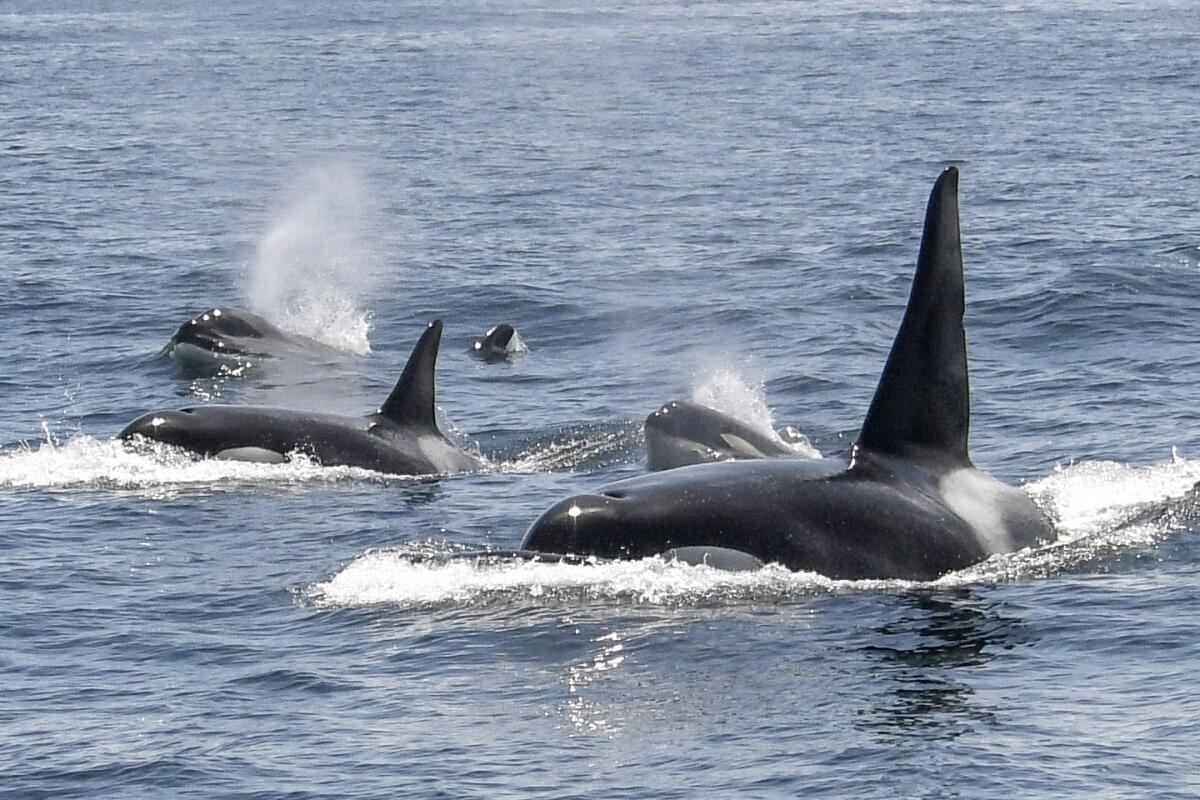
- Show more sharing options
- Copy Link URL Copied!
The attacks started suddenly and inexplicably in the spring of 2020 — pods of endangered killer whales began ramming yachts and fishing boats in European waters, pushing some off course and imperiling others.
Since then, there have been more than 500 reports of orca encounters off the Iberian Peninsula, the most recent occurring Thursday when a trio of whales rubbed against and bumped a racing sloop in the Strait of Gibraltar.
In most cases, the financial and structural damage has ranged from minimal to moderate: Boats have been spun and pushed, and rudders have been smashed and destroyed. Three vessels have been so badly mauled, they’ve sunk.
As the encounters continue, shaky video captured by thrilled and fearful seafarers has ignited a global internet sensation, while experts have struggled to explain the behavior and its timing. The seemingly militant whales have also won over a legion of adoring fans — many transfixed by the notion that the mammals are targeting rich people and exacting revenge for all the wrongs humanity has waged on their species and their ocean home.
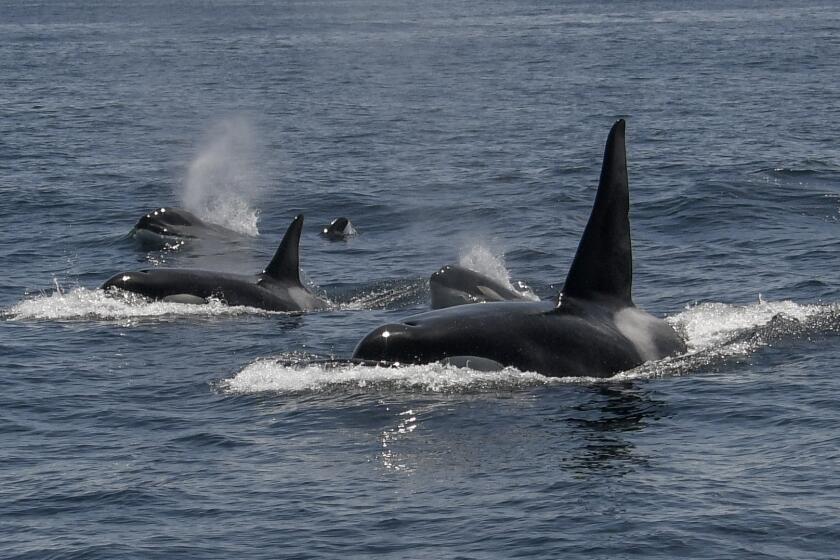
Two dozen killer whales spotted celebrating a hunt off the San Francisco coast
The unusually large group spotted near the Farallon Islands was possibly a meeting of six or seven families.
June 7, 2023
Others wonder if the unusually large pods of multi-ton cetaceans now appearing off the coasts of San Francisco , Monterey and Nantucket, Mass., may soon follow suit.
Despite such rampant speculation on social media, most killer whale scientists have offered a very different interpretation. The Moby-Dick “revenge” narrative for the behavior is highly unlikely, they say.
“That just doesn’t sit right with me,” said Deborah Giles, an orca researcher at the University of Washington in Seattle and director of Wild Orca, a Washington-based conservation research organization.
She noted that despite the long history of orcas being hunted by whalers — and more recently marine parks — these top ocean predators have typically demonstrated a lack of aggression toward humans. There are no verified instances of orcas killing humans in the wild. The only deaths have occurred in marine parks and aquariums, where animals taken from the wild and forced to perform for humans in small tanks have attacked their trainers.
“So, I just don’t really see it as an agonistic activity; I just don’t see it going down like that,” said Giles, who has studied killer whales in the Pacific Ocean, Puget Sound and the Salish Sea for nearly 20 years.
Instead, she thinks the animals are engaging with boats because the vessels are “either making an interesting vibration or sound, or maybe it’s the way the water moves past the keels that is intriguing to these animals.”
The scientific literature is rife with anecdotes and research showing high cognition, playfulness and sociality in the species known as Orcinus orca — and examples of what appear to be the cultural transmission of new behaviors, either via teaching or observation.
In 1987, a female orca in the Pacific waters off North America was spotted sporting a dead salmon on her head. Within weeks, individuals in two other pods also began wearing fish hats. The trend lasted a few months and fizzled out within a year.
In South Africa, the killing of white sharks appears to be growing in popularity among a resident group of killer whales in the waters near Cape Town; Giles has watched a local trend of “phocoenacide” — porpoise killing — grow among a group of whales off the San Juan Islands.
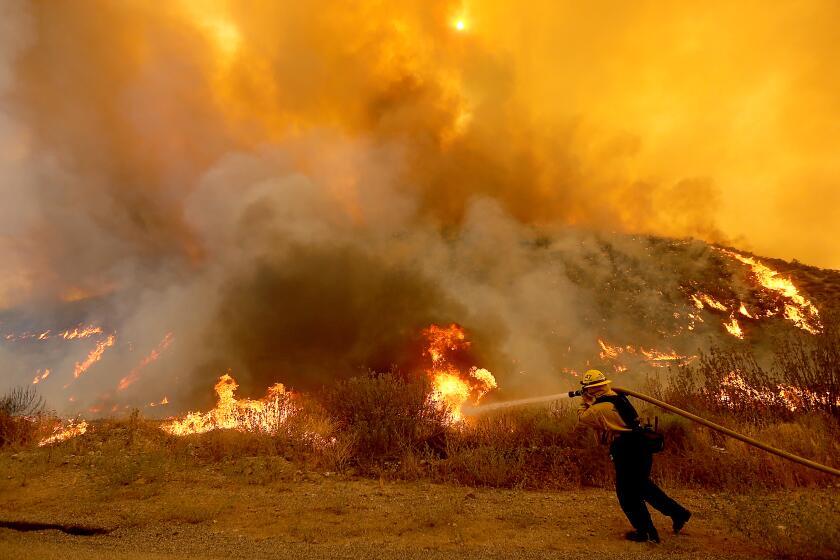
Wildfire burn areas in California are growing ever larger due to greenhouse gas emissions
Between 1996 and 2020, wildfire burn areas in California grew five times larger than in the 25 years prior. Scientists say climate change is to blame.
June 14, 2023
In both cases, the behavior does not appear to be for the purpose of feeding, Giles said. The orcas do not eat the dead animals. For instance, in the case of the porpoises, the killer whales played with them — bandying them about, sometimes surfing with them, other times carrying them on the orcas’ pectoral fins — until the porpoises drowned, at which point they were abandoned, she said.
“Fads” are not unique to orcas. Other animals, including primates and other cetaceans, have also been observed to adopt new behaviors, which then spread through a social group.
Susan Perry, a biological anthropologist at UCLA, has studied a population of capuchin monkeys in Costa Rica, where she has observed and demonstrated the cultural transmission of novel behaviors, including “eye poking” — in which one monkey slips its finger “knuckle deep” between the eyelid and the bottom of another monkey’s eyeball.
But the idea that the whales’ behavior is a response to trauma has gripped many — including the researchers who most closely study this population and first documented the behavior.
In a paper published last year , a team of Portuguese and Spanish researchers suggested the behavior seen in the Strait of Gibraltar orcas could have been triggered by a variety of causes, including trauma.
Alfredo López Fernandez, a killer whale researcher with GT Orca Atlántica, a Portuguese conservation research organization, said it is impossible to know how it started, or which whale or whales may have initially instigated the attacks.
He listed several adult females as the possible original perpetrators — which then taught or showed others how to participate.
There is White Gladis, which seems to be present in most of the attacks; Gladis Negra, which was observed to have injuries in 2020, possibly from a ship strike; and Gray Gladis, which in 2018 witnessed another whale get trapped in fishing gear.
Gladis is a name given to all orcas in the pod that interact with boats; it comes from Orca gladiator, an early nickname given to these boat-jouncing killer whales.
“All of this has to make us reflect on the fact that human activities, even in an indirect way, are the origin of this behavior,” he said.
For Cal Currier’s part, he thinks the whales are entertaining themselves.

Climate & Environment
Bay Area refinery fallout does not pose significant health risk, authorities say
Nearly six months after Martinez Refining Co. released hazardous materials, officials have announced reassuring soil test results.
June 9, 2023
On June 8, as the 17-year-old Palo Alto High School senior sailed through the strait with his father, James, 55, and brother, West, 19, their 30-foot sailboat was accosted and spun in circles.
The rudder was battered, and the trio had to be towed to shore in Spain. “They were playing,” Currier said.
He said that when they pulled in, they were told roughly 30 other boats were ahead of them in line for repairs; half were damaged by the killer whales. He said there were no bite marks on the rudder, and he did not sense aggression from the whales.
For Giles, the Washington killer whale researcher, her biggest concern is that the longer the whales continue this behavior, the more likely it is they’ll get injured or suffer retribution at the hands of humans.
She’s hoping authorities in the region will consider non-traumatic hazing techniques — such as instructing boats to play or make sounds that irritate the whales — to get them to stop. She said studies have shown orcas don’t like the calls of pilot whales and will generally swim away if they hear them. Loud banging sounds, such as hitting a large, metal oikomi pipe underwater, can also be effective.
“Anything that might irritate them, make them lose their interest or swim away,” Giles said.
Currier said he wasn’t too rattled by the whole experience — unlike his dad and brother, who were “scared for their lives.”
The trio have since sold the boat and intend to spend the rest of the vacation on dry land.
More to Read
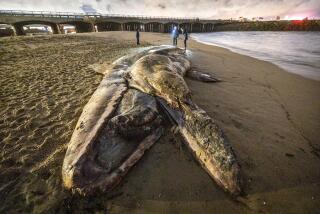
The gray whale die-off on West Coast is over, NOAA declares
March 19, 2024
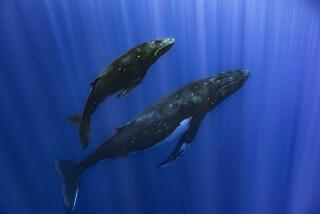
How do whales sing? Lab experiments suggest their voice boxes have a unique feature
Feb. 24, 2024
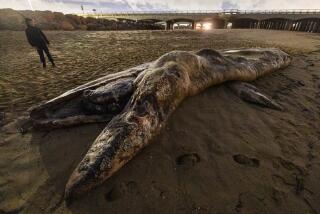
Decaying gray whale washes up on Orange County beach
Feb. 8, 2024

Susanne Rust is an award-winning investigative reporter specializing in environmental issues. She is based in the Bay Area.
More From the Los Angeles Times
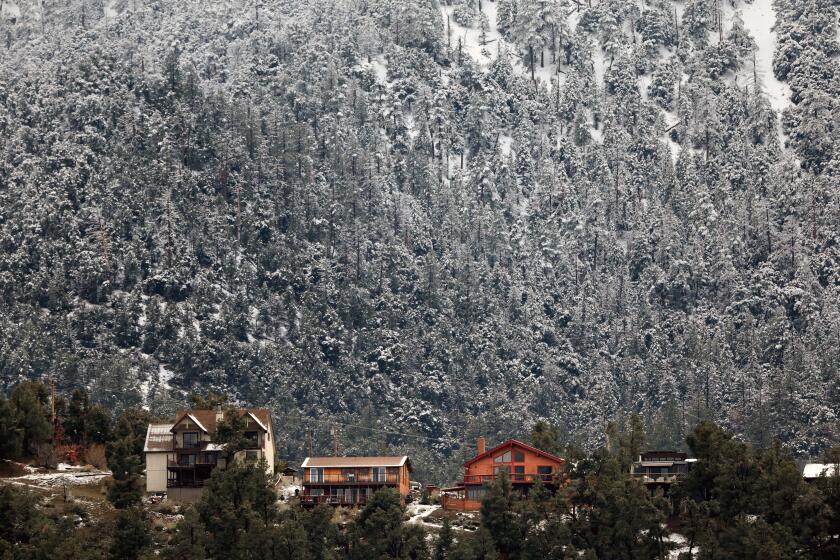
As hungry bears awaken from hibernation, a California mountain village braces for invasion
March 18, 2024
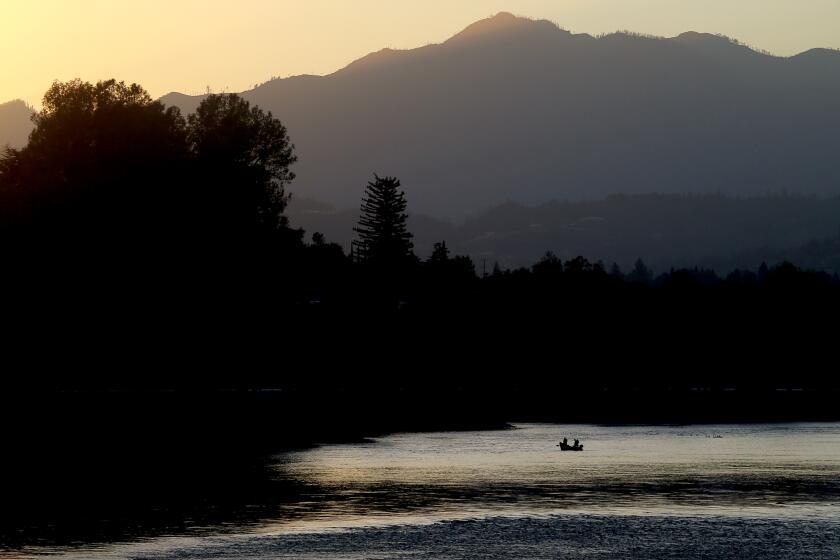
Mystery surrounds sudden increase in steelhead trout deaths near California water pumps
March 15, 2024
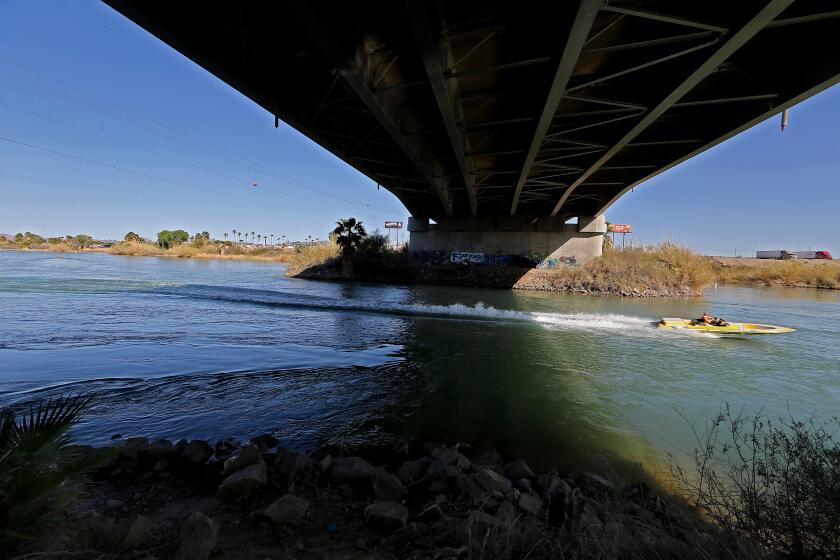
Presence of parasite that’s deadly for dogs now confirmed in California: Signs to watch for
March 14, 2024
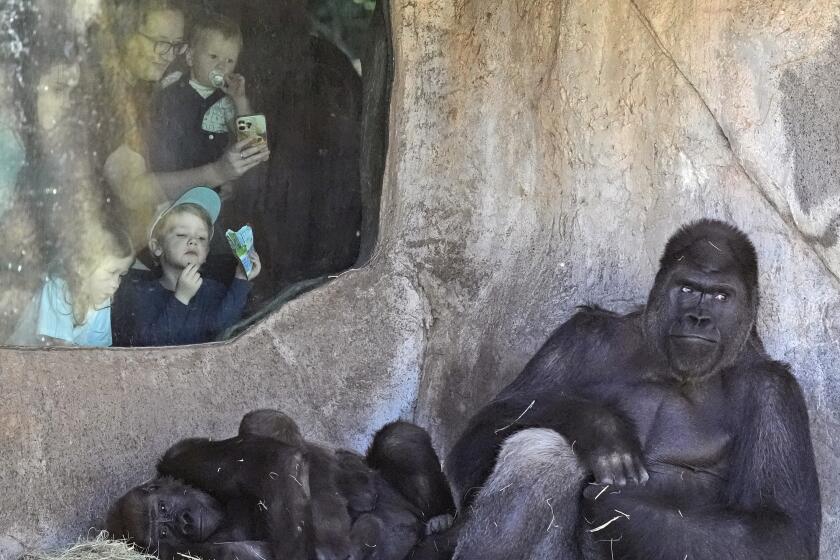
World & Nation
How do animals react during a total solar eclipse? Scientists plan to find out in April
March 13, 2024
Killer whales attack boats off Europe. Could same thing happen in Florida?

It's "Jaws" with a twist. Or is it?
A pod of orcas has gained worldwide attention after sinking a boat in an attack that lasted 45 minutes, Live Science reported .
The Oct. 31 incident is the fourth time in two years orcas have been blamed for sinking ships in southwestern Europe.
While orcas, also known as killer whales, are most commonly found in colder waters, they have been spotted in and around Florida. So could what happened across the Atlantic happen here?
What happened to the yacht attacked by orcas off Morocco?
According to a translated Facebook post made by Polish cruise company Morskie Mile , owner of the sunken boat, a mid-size sailing yacht was attacked by a pod of orcas off the coast of Morocco in the Strait of Gibraltar Oct. 31.
The orcas repeatedly hit the yacht's rudder, causing major damage and causing the boat to take on water. All passengers were safely evacuated before the boat sank.
This wasn't first attack by orcas off the Iberian Peninsula
Incidents involving orcas off the Iberian coast jumped from 52 in 2020 to more than 200 in 2022, though no human injuries or deaths have been reported, according to Orca research group GTOA .
Experts first documented juvenile Iberian killer whales — a "unique subpopulation of killer whales that lives in the northeast Atlantic" — touching, pushing, and even turning vessels, including some fishing and inflatable boats, in 2020, GTOA said.
Experts think the rest of the population could be mimicking the behavior.
Why are the killer whales attacking boats?
Andrew Trites, professor and director of Marine Mammal Research at the University of British Columbia, told CBS News there are two main theories about the attacks, but, for now, it remains to be an “unprecedented” mystery.
The first theory is that orcas are engaging in a type of whale "play" or "sport,” Trites said .
The second theory is that orcas’ years of dealing with traumatic boating injuries have resulted in a "negative experience.”
Are there orcas in Florida waters?
Killer whales have been seen off Florida, including at least three times this year.
In July, a Florida fisherman captured a "once-in-a-lifetime" experience on video when he and some friends encountered a pod of orcas off the Florida Keys .
The orcas were about 18 to 20 miles offshore in about 1,700 feet of water and had just killed something when a group of fishermen spotted them.
In January, an orca beached itself and died off Flagler County . The whale had "signs of various illnesses," officials from the National Oceanic and Atmospheric Administration Fisheries division said at the time.
The whale was an adult female at least 21 feet long and weighed approximately 5,000 pounds.
It was the first killer whale stranding recorded in the southeastern United States, according to Erin Fougeres, Marine Mammal Stranding Program administrator for NOAA's Southeast region.
In September, a group of fishermen spotted a pod of orcas about 100 miles east of Fort Pierce .
Florida, of course, is best known for its orcas kept in captivity which have brought delight, horror and backlash from activists for decades. Attractions are phasing out their killer whales in response to public opinion.
Killer whales normally found in colder waters
Orcas are most commonly found in colder waters, according to the National Oceanic and Atmospheric Administration .
However, they have been spotted all over the world, even in tropical and subtropical waters — including the Gulf of Mexico and off Florida's eastern coast.
It's not uncommon to see orcas swimming around the Bahamas as they move from one place to another, according to Jim Moir, chair of the Marine Resources Council .
In rare instances, the whales will follow migrating fish down into warmer areas such as Florida, Hawaii, Australia, the Galapagos Islands, the Bahamas, and the Gulf of Mexico.
There is a small Western North Atlantic stock of killer whales, as well as a stock in the Gulf of Mexico with around 267 individuals, Fougeres said.
Do orcas attack humans?
While orcas may deserve their fearsome reputation when it comes to other marine animals, they almost never attack humans in the wild , according to LiveScience .
"I don’t think a killer whale would ever hunt a human," said Erich Hoyt , a researcher at Whale and Dolphin Conservation .
"They are fussy eaters, really conservative in terms of whatever they learned from their mothers and from their pod about what constitutes food."
A killer whale did bite a surfer off California in 1972, but the orca quickly let go, according to the Lodi News-Sentinel . After interviewing the surfer, Hoyt said the whale may have mistaken the surfer as a seal.
Are killer whales endangered?
It is estimated that there are around 50,000 killer whales globall y, according to NOAA Fisheries
All killer whale populations are protected under the Marine Mammal Protection Act . Only two populations receive additional special protections under federal law:
- Southern Resident Distinct Population Segment, listed as endangered under the Endangered Species Act , which range from central California to southeast Alaska.
- AT1 Transient stock, designated as depleted under the Marine Mammal Protection Act and found in the eastern North Pacific. Their numbers have dropped from 22 to 7 whales since the 1989 Exxon Valdez oil spill.
Quick facts about orcas
- Weight : up to 11 tons
- Length : Up to 32 feet
- Lifespan : 30 to 90 years
- Threats : Chemical contaminants; Disturbance from vessel traffic and noise; entanglement in fishing gear; food limitations; oil spills.
- What they eat: Diet is primarily determined by the culture — learned hunting tactics — of each type. They are considered an apex predator.
How to report a stranded or injured marine animal
If you see a sick, injured, stranded, or dead marine mammal or sea turtle, contact the FWC at 888-404-FWCC (888-404-3922) or the Florida Sea Turtle Stranding and Salvage Network at 888-404-FWCC (888-404-3922).
On an iPhone, you can use the Dolphin and Whale 911 app to report a stranded marine mammal.
NOAA recommends staying at least 150 feet away from a stranded marine mammal or sea turtle.

Scientists to test noise deterrents meant to scare orcas after a rapid rise in boat rammings
- Noise deterrents are being developed to scare orcas away from boats, a Portuguese trade association said.
- Orcas off the Iberian coast have been ramming into boats and ripping off their rudders.
- The association said sailors in the area are "afraid" to take their boats into Portuguese waters.
Researchers are planning to develop and test noise deterrents meant to scare away orcas after a rapid rise in reports that the creatures are ramming boats off the Iberian coast.
"Some lines of development of acoustic deterrents are being developed that will be tested this summer, in order to try to find options for the protection of sailboats and minimize the number of interactions," António Bessa de Carvalho, president of the National Association of Cruises (ANC), told Portuguese news agency Lusa.
The ANC, the Portuguese Navy, and the Institute for the Conservation of Nature and Forests have been holding meetings since March to find a solution to orcas damaging boats by ramming into them and grabbing and ripping off their rudders, per Lusa.
Alfredo López of the Grupo de trabajo Orca Atlántica, which is collaborating with the Portuguese government, told Insider the work is in the very early stages.
He added they are focusing on finding solutions that "comply with the legislation" and "do not cause environmental damage."
Noise deterrents typically work by emitting pulses of high-frequency sound to scare away sea creatures from an area.
While types of acoustic deterrents exist, none are specifically designed to be used for orcas and sailboats, he said.
"You have to invent it. They do not exist because there was never a need," he said.
One focus, López said, is to ensure the deterrent does not contribute more noise to the ocean.
"Adding more noise into the ocean can be harmful to living things. That is why the previous comment would not develop continuous emission deterrents," he said.
Dozens of reports of interactions between orcas and boats have been reported, most of which have taken place off the Iberian coast. The creatures' motivations are not clear , but the behavior seems to be spreading among local pods of orcas.
One recent interaction was reported as far north as the Shetland islands, off the coast of Scotland.
A video released on Thursday showed orcas interrupting a boat race in the Atlantic Ocean last week. The video shows the animals repeatedly rubbing against the ship's rudders, Insider previously reported.
"Three orcas came straight at us and started hitting the rudders. Impressive to see the orcas, beautiful animals, but also a dangerous moment for us as a team," skipper Jelmer van Beek said, Insider previously reported.
At least two boats have been sunk as a result of the interactions, and the exchange can leave the boats unable to steer their course and having to be rescued at sea, per Lusa.
"Sailboat owners are very concerned and are currently afraid to take their boats to the Algarve", the southernmost region of Portugal, "as they do every year," Bessa de Carvalho told Lusa.
Desperate sailors have been trying all sorts of techniques to keep orcas away from the boats, such as throwing sand over the side of the ship, navigating backward, hitting the orcas or throwing firecrackers and flares at them, throwing lemons in the water, or hitting dishes and kitchen items to make noise, none of which have been particularly effective, López said.
The Grupo de trabajo Orca Atlántica recommends slowing down the boat's engine if possible. That has worked in about 60% of cases, said López.
For the time being, Lopez said the best way to protect boats is for sailors to "be informed."
"Sailors can consult the website and GT Orcas mobile application (Google Play and Apple Store) to find out about hot spots, be prepared if they sail in those areas, avoid sailing at night and approach the coast, as far as possible," he said.

Why Children's Book Council of Australia stickers are highly coveted by publishers, authors and illustrators
When Amy Doak was notified by a friend that her debut novel, Eleanor Jones is not a Murderer, had made the Children's Book Council of Australia (CBCA) annual list of notable books, she was shocked.
"When I was growing up the books that came into the library with the stickers were really important. It was a really big deal," Doak said.
Being in the running for a CBCA Book of the Year award is just one of the "pinch-me" moments Doak has experienced since her YA (young adult) murder mystery thriller was released in September 2023.
"Seeing it at an airport bookstore was pretty amazing," she said.
"I always buy a book when I go anywhere so that's such a dream, and Bookish (a local independent bookshop) did a window display for me."
Doak, a freelance writer from Bendigo, said she didn't think her casual or conversational style of writing would ever be awarded or have a sticker on it, because it wasn't literary fiction or poetry.
"It is interesting how a lot of people do see it [the Notables list] as a bit of a catalogue of what is worth reading and CBCA do a great little summary of why they chose each book that's on their website," she said.
"I even had a girlfriend who has younger children say that's how she buys her kids' books every year, she goes through the notables and makes selections from that."
Doak said another friend, who was immersed in the children's literary world in Australia, saw the annual CBCA awards as the equivalent of the Oscars for kids' books.
Spreading the message
For Castlemaine author and illustrator Trace Balla, CBCA Book of the Year recognition is a nice "pat on the back" but she'd like to see her books become a conduit for cultural change.
"I really want to get those messages out there about caring for the Earth, connecting with country, and respecting First Nation," she said.
"I didn't realise until I won one of those prizes, it really did spread the book and message wider."
Her graphic novel Leaf-light, A Story about Caring for Each Other, is one of this year's Notables in the Picture Book category and is a follow-up to her award-winning 2020 book, Landing with Wings.
Balla's book Rockhopping, about an eventful hike in Gariwerd (the Grampians), won the CBCA Book of the Year Younger Readers category in 2017.
Other categories include Early Childhood, Older Readers, New illustrator and the Eve Pownall Award for Information Books.
The Notables, shortlist and eventual winners and honour books are chosen by a panel of volunteer judges from the industry, who sit two-year terms.
The CBCA also runs a shadow judging program every year, which involves young readers choosing their own winners from the shortlist.
Balla said if Leaf-light was in the shortlist, to be announced March 19, it would mean more exposure for her message.
"It's like a chicken lottery, really, whatever happens it's a good thing. I mean it's lucky to just get published," she said.
Balla said she could "ride on the coat tails of an award a bit" getting work as an illustrator, doing workshops and speaking at festivals, schools and libraries to pay the bills.
"I live fairly frugally a lot of the time," she said.
"I ride a bike and I grow veggies."
Doing it for love, not the money
Photographic illustrator Lorena Carrington, also based at Castlemaine, couldn't be more thrilled her book Satin, with author Sophie Masson, has also made this year's Notables list.
"You know that when it's got that sticker it's going be a good one," Carrington said.
"When I was a kid, books like John Brown, Rose and the Midnight Cat and Who Sank the Boat and The Eleventh Hour were some of my absolute favourite books, and I can still remember so clearly the feel of that sticker, it was slightly embossed.
"It's one of those strange core childhood memories."
Carrington said when you spent so long working on a book you could lose perspective and have no idea if anyone else was going to like it, so being on the Notables list was incredibly validating.
"When you have a book come out, it spends a few weeks or maybe a few months on the bookshop shelves if you're lucky, and then it's gone and the next book coming up takes its place," she said.
"But to get a Notable with the CBCA means that book gets a second life … it's back in the bookshop, it will go into more school libraries, and it gets more readers, which is all we ever want really.
"And I don't care if it goes any further, I don't care if it gets shortlisted or anything … there's something so special about that little round sticker and they can't take that away."
2023 Book of the Year winners and honour books are announced on August 16.
ABC Central Vic —local news in your inbox
- X (formerly Twitter)
Related Stories
The son of our new children's laureate hated reading. she wants to help every kid find the love for it.
‘I think orcas would have something to say about our religion’: Writer Shaun Tan doesn’t believe in God
Authors say booksellers play a critical role in sharing diverse stories and can make or break careers
- Awards and Prizes
- Books (Literature)
- Castlemaine

IMAGES
COMMENTS
The Oct. 31 incident occurred in the Strait of Gibraltar where a pod of orcas sank a mid-size sailing yacht named the Grazie Mamma after a 45-minute interaction, Live Science reported.
A pod of orcas has sunk a yacht in the Strait of Gibraltar. A pair of orcas swim off the west coast of Vancouver Island in 2018. For 45 minutes, the crew of the Grazie Mamma felt like they were ...
Spanish coast guards rescued the crew and towed the boat to Barbate, but it sank at the port entrance. Two days earlier, a pod of six orcas assailed another sailboat navigating the strait.
Three orcas struck the rudder and side of a sailing yacht, causing it to eventually sink, as was reported earlier this month in a German publication called Yacht. One theory put forward by Alfredo ...
A yacht sank after it was attacked by a pod of orcas for 45 minutes, a sailing company has said, marking the latest assault on a boat by the sea mammals this year.. Polish tour operator Morskie ...
Recent boat attacks might be driven by trauma. Killer whales are pictured during a storm in the fjord of Skjervoy in 2021 off the coast of northern Norway. Researchers say orcas are stepping up ...
Orcas caused enough damage to sink a yacht in the Strait of Gibraltar last week. A small pod has been slamming boats in recent years, worrying skippers charting routes closer to shore. An orca ...
Orcas Sank 3 Boats in Southern Europe in the Last Year, Scientists Say. A small group of orcas is ramming into sailboats in waters off the Iberian Peninsula. Researchers say they do not know what ...
Scientists don't know why. An orca pod seen in the Strait of Gibraltar in 2021. Ester Kristine Storkson was asleep on her father's small yacht earlier this month, sailing off the coast of France ...
The orcas are at it again: A pod of the black-and-white marine mammals sank a sailing yacht off the coast of Morocco in the Strait of Gibraltar last week. This marks the fourth vessel orcas have ...
A pod in the strait of Gibraltar has sunk three boats and damaged dozens of others, and their story has captivated the world. ... Orcas nudge rudder of yacht near Gibraltar - video. There are ...
A yacht operated by the Polish boat touring agency Morskie Mile sunk in the Strait of Gibraltar last week, after being attacked for 45 minutes by a pod of orcas. Morskie Mile / Facebook
A pod of orcas has attacked and sunk another boat in southwestern Europe after relentlessly bombarding the vessel and its crew for almost an hour on Halloween. It is the fourth time that orcas ...
On Oct. 31, a pod of killer whales swarmed a Polish yacht sailing in the Strait of Gibraltar. For 45 minutes, the orcas hit the vessel's rudder and damaged the boat, according to the company ...
Killer whales have sunk yet another boat in southwestern Europe, marking the fourth such incident in the region in the last two years. The latest attack saw a pod of orcas target a yacht in the ...
Orcas living off Europe's Iberian coast recently struck and sunk a yacht in the Strait of Gibraltar. Scientists suspect that this is the third vessel this subpopulation of killer whales has capsized since May 2020, when a female orca believed to be the originator of this behavior suffered a traumatic encounter with a boat.
On May 5, the 50-foot sailing yacht Alboran Champagne sank after being struck by orcas the previous night — the third vessel in the last three years to go under after a run-in with some unruly ...
A yacht was attacked by a group of orcas off the coast of Portugal on Monday, causing a panicked sailor to light up his emergency beacon. Phep Philouceros, a 70-year-old retired sailor, was ...
A pod of orcas in southwestern Europe sank a sailing boat on Oct. 31 after a non-stop, 45-minute attack, Live Science reported . The incident is the fourth occurrence in two years where orcas ...
Why are killer whales going 'Moby-Dick' on yachts lately? Experts doubt it's revenge. An unusually large group of killer whales was spotted off the coast of San Francisco on May 7. The ...
According to a translated Facebook post made by Polish cruise company Morskie Mile, owner of the sunken boat, a mid-size sailing yacht was attacked by a pod of orcas off the coast of Morocco in ...
Published Nov 5, 2023 5:25 PM by The Maritime Executive. A pod of orcas has sunk another yacht off the coast of Spain, this time near the Strait of Gibraltar, according to Polish sail training ...
Orcas, which are big sea animals, have attacked a yacht again. This time, they made a Polish yacht sink in the Strait of Gibraltar, a trend widely visible since 2020. The orca (Orcinus orca), also called killer whale, is a toothed whale belonging to the oceanic dolphin family, of which it is the largest member. The yacht that was targeted by Orcas this time around was Grazie Mamma II, and it ...
A video released on Thursday showed orcas interrupting a boat race in the Atlantic Ocean last week. The video shows the animals repeatedly rubbing against the ship's rudders, Insider previously ...
Being in the running for a CBCA Book of the Year award is just one of the "pinch-me" moments Doak has experienced since her YA (young adult) murder mystery thriller was released in September 2023.